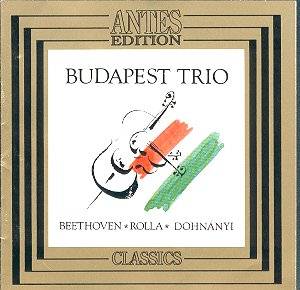Ludwig von BEETHOVEN (1770 - 1827)
Serenade, op.8
Alessandro ROLLA (1757 - 1847)
Trio concertant Nr.6 G-Dur
Ernst von DOHNÁNYI (1877 - 1960)
Serenade op.10
 Budapest Trio Budapest Trio
Ferenc Kiss - Violin
Tivadar Popa - Viola
Peter Wöpke - Cello
Recorded: Budapest, 1988/9
 ANTES EDITION BM-CD 31.9011
[77.46] ANTES EDITION BM-CD 31.9011
[77.46] |
 |
|
This imaginative selection of String Trios opens with Beethoven's
Serenade Op.8, a traditional classical combination of small dance
movements, including Marches, Minuets, a Polacca, and Variations. Published
in 1797, it is one of Beethoven's earlier compositions, and consequently
shows little of the turbulence that hallmarks his later, more romantic works.
The Budapest Trio has evidently taken this into consideration; the lightness
of their charming, energetic interpretation results a in crisply stylistic
classical texture.
Alessandro Rolla's Trio Concertante is something of a revelation.
Rolla was a virtuoso player himself, holding positions as a violist in the
Milanese ducal court, as first violinist and orchestral director of La Scala,
and as a Professor at Milan Conservatory, where he taught Paganini amongst
others. Consequently, his writing is immaculately crafted to suit the string
idiom, and it does so with immense style. His ascending figurations in the
final Rondo Presto are particularly showy, yet they are always tasteful
and classically conformist - no Paganini-style exhibitionism here! Again,
the Budapest Trio's performance is beautifully executed with only the slightest
of occasional fumbles; Ferenc Kiss's violin playing, around which the writing
inevitably centres, is particularly commendable.
Following two such accessible works is a difficult task, but the distinctive
opening motifs of Ernst von Dohnányi's Serenade herald
a piece which has become central to the string trio repertoire. The opening
movements seem remarkably classical in structure for a composer of the late
Romantic period, and the similarity with Beethoven's Serenade Op. 8 is striking
- both compositions begin and end with marches which represent the metaphorical
entry and exit of the musicians, and both contain a set of variations as
the penultimate movement. Dohnányi's writing becomes more romantic
in the third movement, a chromatic Scherzo that incorporates a remarkable
double fugue. The performers' deliberate agitation during the running quaver
passages is quite exhilarating, and the darker, more boding Adagio is played
with great sonority of sound.
Enormous care has evidently gone into the audio and musical production; if
only the same could be said for the inlay booklet! Attractively packaged
it may be, but the misspelling of Dohnányi on the back cover
(Dohnány) is inexcusable! One of the borders is out of line
- this may be of little importance in itself, but even a couple of minor
errors do begin to visually detract from the overall impression. Most
entertaining though, are the rather endearing programme notes, which (although
intellectually sound and very informative) appear to have lost something
in translation. We are assured that Kiss and his cellist, Wöpke, are
both 'international solists', and that parts of Dohnányi's Serenade
include an 'expecially good invention', and a section which is 'like a hommage
to Brahms'. At least they spelt Dohnányi right this time…
It is testament to the adventurousness of Antes Edition that two commercially
non-mainstream works (Dohnányi and Rolla) were included on the disc,
but the risk pays off. Although Beethoven became a pioneer of romanticism,
his Serenade is rooted firmly in the classical tradition; Dohnányi,
by contrast, harks back to the music of Brahms - his major influence - and
inflects his Brahmsian textures with a hint of Eastern European tonality.
The resulting disc is a subtly contrasting one, in which the two Serenades
are balanced perfectly by the inclusion of Rolla's trio. The playing of the
Budapest Trio is impeccable throughout, with great clarity of interpretation
and articulation. Their fresh, wholesome sound is well suited to the classical
repertoire; it would be interesting to see how they would react to more
emotionally charged compositions.
Simon Hewitt Jones
CONTACT DETAILS
Bella Musica Edition
distribution@bellamusica.de
Bella Musica Edition (Antes Edition)
Eisenbahnstr. 30
D- 77815 BÜHL
Telephone: +49 (0)7223-98550
Telefax: +49 (0)7223-985566

